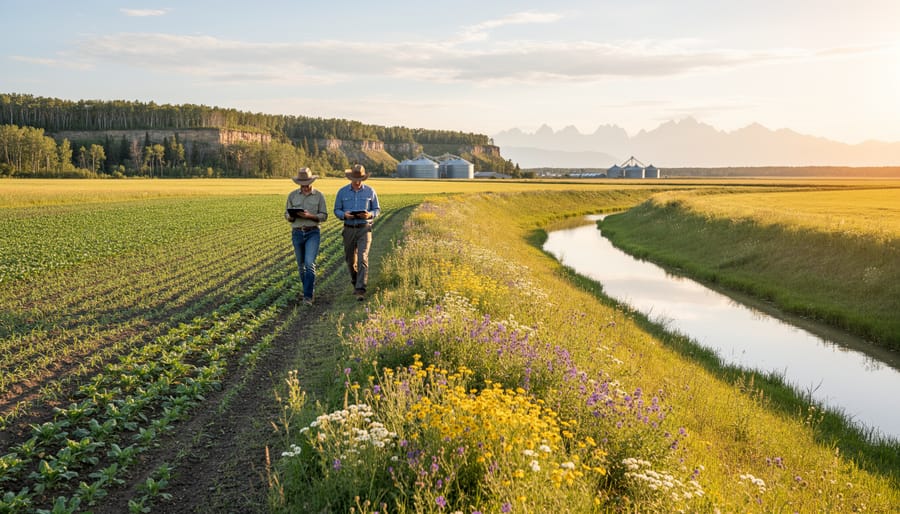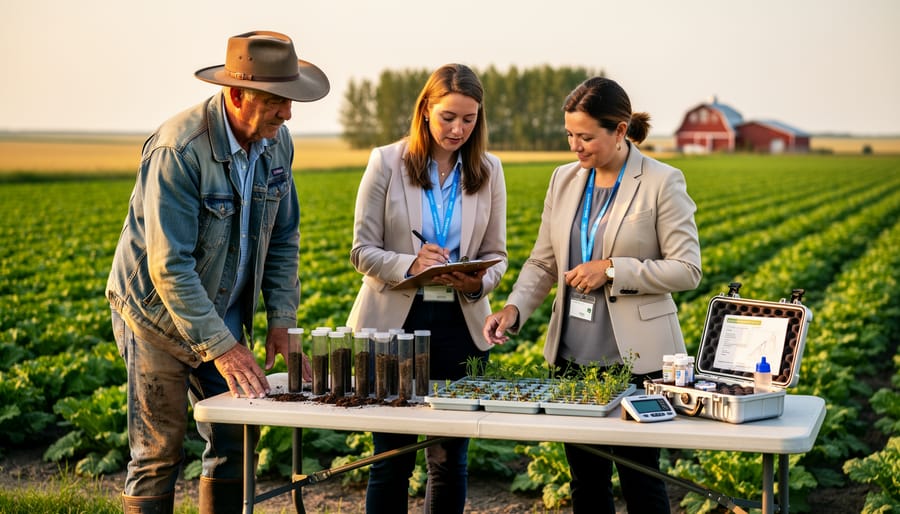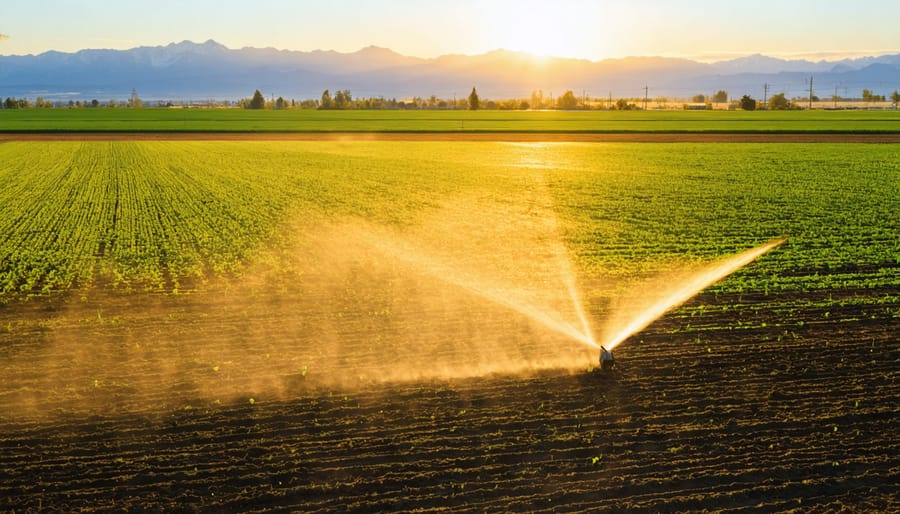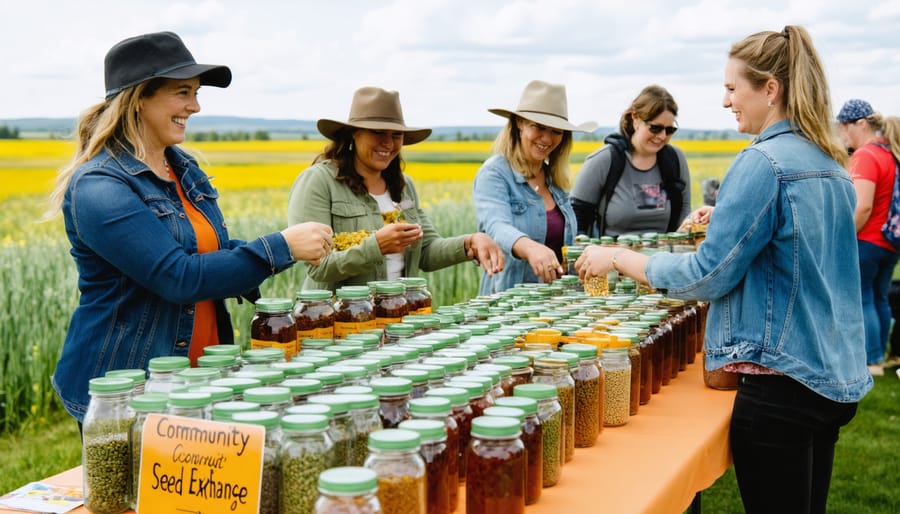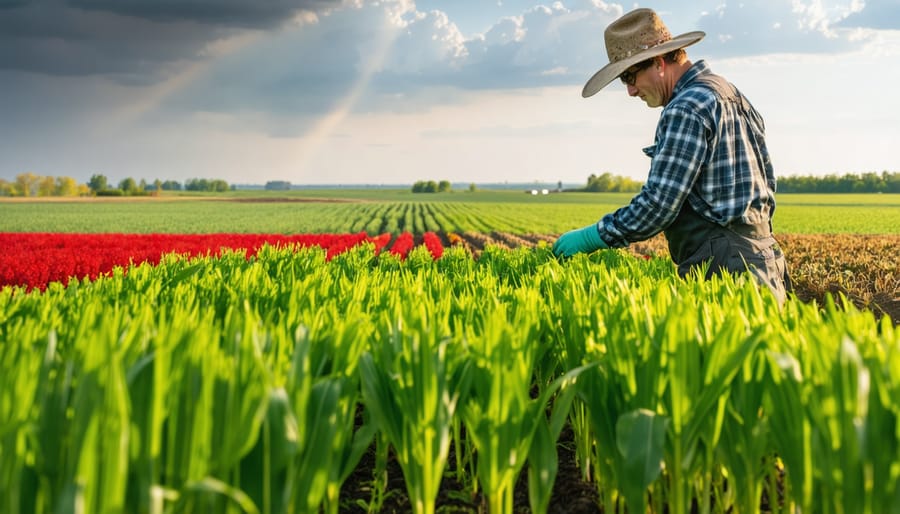Canada’s organic regime stands as a cornerstone of sustainable agriculture, transforming how farmers across the nation produce and market their crops. From small family farms in Alberta’s prairies to large-scale operations in Ontario’s heartland, this comprehensive certification system has revolutionized Canadian agriculture since its federal regulation in 2009. Operating under the Canada Organic Office (COO) and the Canadian Food Inspection Agency (CFIA), this robust framework ensures integrity throughout the organic supply chain while opening lucrative markets both domestically and internationally.
For Canadian producers, the organic regime represents more than just certification—it embodies a commitment to soil health, biodiversity, and sustainable farming practices that have proven increasingly valuable in today’s climate-conscious market. With organic food sales exceeding $6.5 billion annually in Canada and growing at six times the rate of conventional food sales, this system offers farmers a clear path to premium markets while supporting environmental stewardship.
As global demand for certified organic products continues to surge, understanding and navigating Canada’s organic regime has become essential for agricultural professionals seeking to adapt and thrive in an evolving industry. This systematic approach to organic certification not only ensures compliance with international standards but also builds consumer trust through transparent, verifiable practices.

The Framework of Canada’s Organic Certification System
Federal Regulations and Standards
Canada’s organic sector is governed by robust organic certification standards outlined in the Organic Products Regulations (OPR) and the Canadian Organic Standards (COS). These regulations ensure consistency and maintain the integrity of organic products across the country.
The Canadian Food Inspection Agency (CFIA) oversees the implementation of these standards, which include two main components: CAN/CGSB-32.310 for general principles and management standards, and CAN/CGSB-32.311 covering permitted substances lists.
For Alberta farmers, compliance means following specific requirements for soil management, crop rotation, and livestock care. Key regulations include maintaining detailed records of production methods, implementing a three-year transition period for conventional land, and using only approved substances for pest control and soil enhancement.
The standards require annual inspections by CFIA-accredited certification bodies, who verify compliance through on-site visits and documentation review. Producers must demonstrate their commitment to organic principles through comprehensive record-keeping and transparent production practices.
These regulations align with international standards, facilitating trade while ensuring Canadian organic products meet global expectations. Regular updates to the standards, typically every five years, keep them current with evolving organic practices and scientific understanding, helping Alberta farmers stay competitive in the global organic market.
Certification Bodies and Process
In Canada, organic certification is carried out by CFIA-accredited certification bodies (CBs) that operate across the country. These organizations work directly with farmers and producers to verify compliance with the Canadian Organic Standards. Currently, there are over 20 accredited certification bodies, including regional organizations like Pro-Cert Organic and the Centre for Systems Integration.
The certification process typically begins with a thorough review of your farm’s practices and documentation. You’ll need to complete an application and develop an organic system plan that outlines your production methods, pest management strategies, and record-keeping systems. Following this, an inspector will conduct an on-site assessment of your operation.
For Alberta farmers, the transition period usually takes 36 months, during which your land must be managed according to organic standards without using prohibited substances. During this time, certification bodies provide guidance and support to help you meet requirements.
Local farmer Mike Thompson from Red Deer shares, “Working with our certification body made the transition smoother than expected. They provided clear guidelines and were always available to answer questions about compliance.”
Annual inspections and renewals are required to maintain certification. While costs vary depending on operation size and complexity, many farmers find that certification fees are offset by premium prices for organic products and access to expanding markets.
Key Requirements for Organic Certification
Soil Management and Crop Production
The Canadian Organic Regime emphasizes the vital importance of sustainable soil management practices as the foundation of successful organic farming. Producers must maintain or enhance soil fertility through crop rotations, cover cropping, and the application of plant and animal matter compost. The use of synthetic fertilizers is prohibited, requiring farmers to rely on natural methods to build soil health.
Crop production guidelines mandate a 36-month transition period during which land must be managed according to organic standards before certification. During this time, farmers must implement practices that promote biodiversity and maintain ecological balance. This includes establishing buffer zones between organic and conventional fields, typically ranging from 8 to 30 meters depending on contamination risk.
Pest management focuses on preventive measures such as selecting resistant varieties, maintaining beneficial insect habitats, and implementing mechanical controls. Chemical pesticides are strictly prohibited unless specifically listed in the Permitted Substances List (PSL).
Alberta farmers have found success with diverse crop rotations that include pulse crops like lentils and field peas, which naturally fix nitrogen in the soil. Many producers integrate green manure crops, such as clover or alfalfa, to improve soil structure and fertility. Proper documentation of all soil-building activities, including timing of operations and materials used, is essential for maintaining certification compliance.
Water management is equally critical, with emphasis on conservation methods and protecting water quality. Irrigation systems must be designed to minimize soil erosion and prevent nutrient leaching, while promoting efficient water use throughout the growing season.

Livestock and Animal Care Standards
The Canadian Organic Regime maintains strict organic livestock management guidelines that prioritize animal welfare and natural behaviors. These standards require producers to provide livestock with appropriate outdoor access, suitable shelter, and sufficient space for movement and socialization.
Animals must have access to pasture during grazing seasons, with ruminants spending at least 120 days annually on suitable land. Indoor spaces need adequate ventilation, natural light, and enough room for animals to stand naturally, lie down easily, and express normal behavioral patterns.
Feed requirements stipulate 100% organic feed sources, with provisions for grazing on transitional land under specific conditions. Young mammals must receive natural milk, preferably from their mothers, for a minimum period (90 days for cattle, 40 days for sheep and goats). The use of synthetic medications is strictly limited, with emphasis on preventive health measures through proper nutrition and stress reduction.
Housing conditions must maintain appropriate temperature, humidity, and air circulation levels. For example, dairy cattle require individual maternity pens, while poultry needs access to dust bathing areas and perches. The standards prohibit tie-stall housing for dairy cattle, except in small herds under specific conditions.
These requirements reflect the regime’s commitment to harmonizing productive farming with animal welfare. Many Alberta farmers have successfully implemented these standards, reporting improved herd health and reduced veterinary costs through preventive care approaches. The guidelines also align with consumer expectations for humanely raised organic livestock, supporting both ethical farming practices and market demand.
Alberta’s Success Stories in Organic Farming
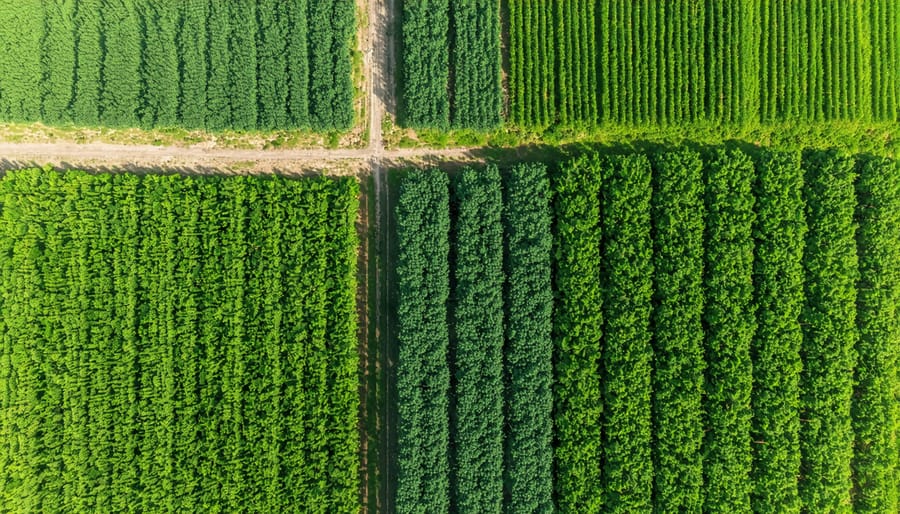
Local Farm Transitions
The story of Prairie Gold Farms in Red Deer County exemplifies a successful transition to organic farming. Owner Sarah Thompson started her transition in 2016 with 160 hectares of cropland, implementing changes gradually over three years. By focusing first on soil health through cover cropping and rotational grazing, she maintained farm income while building organic matter in her fields.
In Manitoba, the Miller Family Farm demonstrates how multi-generational operations can embrace organic practices. Their 400-hectare grain operation completed certification in 2019, reporting a 15% increase in net profit despite initial challenges. They credit their success to careful planning and strong relationships with local organic mentors.
The Forest Creek Market Garden near Edmonton presents a smaller-scale success story. Owners David and Maria Chen transitioned their 4-hectare vegetable operation over two years, developing direct-to-consumer relationships that supported them through the transition period. They now supply three farmers’ markets and operate a thriving CSA program.
These transitions weren’t without challenges. Common themes include the importance of detailed record-keeping, building strong soil health before certification, and developing reliable markets. Most successful farms report maintaining conventional production on part of their land during transition, helping to stabilize income. They also emphasize the value of connecting with experienced organic producers and attending workshops through provincial organic associations.
Economic Benefits and Market Access
Certified organic farms in Canada enjoy significant economic advantages through premium pricing and expanding market opportunities. According to Statistics Canada, organic products typically command 20-100% higher prices compared to conventional alternatives, providing farmers with enhanced profit margins despite potentially lower yields.
The Canadian Organic Regime opens doors to lucrative export markets, particularly the United States and European Union, through established equivalency arrangements. These agreements eliminate the need for multiple certifications, reducing costs and administrative burden for Canadian producers. The domestic market also continues to show strong growth, with Canadian organic food sales exceeding $6.5 billion annually and growing at roughly 8.7% per year.
Alberta organic farmers have reported particular success in specialty grain markets, with organic wheat and pulses fetching premium prices in both domestic and international markets. Local success stories include the Prairie Organic Grain Initiative, which has helped farmers secure long-term contracts with processors and retailers.
Financial support programs are available through various channels, including the Canadian Agricultural Partnership, which offers funding for transition periods and certification costs. Additionally, organic certification can provide access to niche markets and direct-to-consumer sales opportunities, allowing farmers to build stronger relationships with their customers and maintain more stable pricing structures throughout market fluctuations.
Support Resources and Community Networks
Government Programs and Assistance
The Canadian government offers several support programs to help farmers transition to and maintain organic certification. Through the Canadian Agricultural Partnership (CAP), producers can access funding for certification costs, equipment upgrades, and training programs. In Alberta, farmers can receive up to $8,000 in cost-shared funding through the Environmental Stewardship and Climate Change Producer Program.
The Organic Science Cluster, a partnership between the government and the Organic Federation of Canada, provides research funding and technical support to strengthen the organic sector. Producers can also benefit from the AgriStability program, which helps manage income risks during the transition period to organic farming.
Regional initiatives like Alberta’s Organic Producer Assistance Program offer mentorship opportunities and networking events. First-time organic producers can access specialized consulting services and educational workshops at reduced rates. Additionally, the Prairie Organic Development Fund supports market development and promotion of organic products, helping farmers expand their reach in both domestic and international markets.
These programs demonstrate the government’s commitment to growing Canada’s organic sector while supporting farmers through the certification process.
Industry Organizations and Mentorship
Canada’s vibrant network of organic farming organizations provides invaluable support and guidance for both new and established organic producers. Organizations like the Organic Federation of Canada (OFC) and Canadian Organic Growers (COG) offer comprehensive mentorship programs connecting experienced organic farmers with those transitioning to organic practices.
In Alberta, the Organic Alberta mentorship program pairs new organic farmers with seasoned mentors for a full growing season. These relationships often extend beyond the formal program, creating lasting connections within the organic farming community. Mentors provide practical advice on certification processes, soil management techniques, and marketing strategies specific to the Canadian organic market.
Additionally, regional organic associations host regular workshops, field days, and networking events where farmers can share experiences and learn from each other’s successes and challenges. These organizations also maintain resource libraries, offering access to research papers, technical guides, and case studies relevant to Canadian organic production methods. For those starting their organic journey, these support networks prove essential in navigating the certification process and building successful organic operations.
The Canadian Organic Regime represents a robust framework that empowers farmers to meet growing consumer demand while protecting our environment for future generations. Throughout Alberta and across Canada, farmers who have embraced organic certification are experiencing the benefits of premium pricing, increased market access, and stronger connections with their communities.
By following the established certification process, maintaining detailed records, and implementing required practices, producers can successfully navigate the transition to organic farming. The investment in time and resources is balanced by the long-term advantages of sustainable agriculture and the satisfaction of producing high-quality organic products that consumers trust.
Success stories from Alberta farms demonstrate that organic certification is achievable regardless of farm size or crop type. From small family operations to large-scale producers, the organic community continues to grow, supported by certification bodies, agricultural experts, and fellow farmers who understand the unique challenges and opportunities of organic farming in our region.
As demand for organic products continues to rise, now is an ideal time to consider organic certification. Resources and support are readily available through local certification bodies, producer associations, and government programs. By joining Canada’s organic community, you’ll not only contribute to environmental stewardship but also position your operation for sustainable growth in an expanding market.
Take the first step today by connecting with a local certification body to discuss your farm’s potential for organic certification. Your journey toward organic production can start with a simple conversation about your goals and vision for the future.




